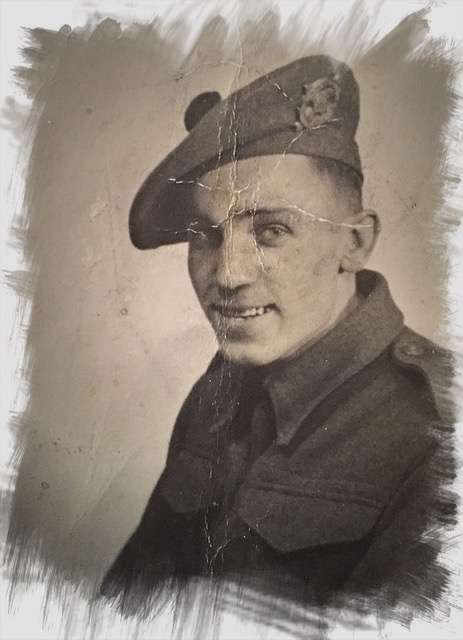
My father, Joe, was 14 years old when the Second World War began. For the first few months nothing seemed to be happening and, along with his friends, he thought it was going to be a great adventure. Then his neighbour returned from Dunkirk, a shadow of the man he was just six months before. Fears were raised that the Germans would invade Britain but the heroes of the Battle of Britain saved the day, but this was quickly followed by the Blitz bombings and he then realised the seriousness of war. My father joined the Home Guard and even though some of the antics were exactly like Dad’s Army, he learnt about discipline, manoeuvres and comradeship.
On his 18th birthday he joined the Tyneside Scottish Black Watch at Perth barracks and began a course of infantry training that was to last eighteen months. He travelled up and the country training for beach landings, the use of a bren gun, driving, survival, combat tactics, physical training and anything and everything else the army could think of. It was obvious they were training for something specific but it was only in the spring of 1944 when the rumours began to circulate. His battalion arrived in Thetford and by May they were on stand-by. The D Day Landings started on 6 June and they were moved to Newhaven ready to depart on 12 June as a support unit. The sea was calm as they crossed to Normandy, but Joe’s nerves made his stomach churn. They arrived on Gold beach and were put on ‘stand by’ ready to move at one hour’s notice to wherever they were needed. This was the first time the men were facing the enemy and most of them were just 19 years old.

Eventually they moved inland towards Tilly-sur-Seulles and on 1 July engaged in the battle of Rauray. Following the victory the surviving Tyneside Scottish infantry soldiers were transferred to the 51st Highland Division Black Watch. My father was assigned to the 154 Brigade and moved to liberate Le Havre. The Normandy Campaign ended in August 1944 and the men moved to Belgium. In January 1945 my father’s Brigade were called upon to assist the Americans in the Battle of the Bulge. He spent his 20th birthday in a snowdrift where he suffered frost bite. Following victory over the Germans at La Roche, he moved north to Holland and joined the Canadians close to the river Rhine in the Reichswald forest area. They advanced towards the Rhine forcing the Germans to retreat. Following this success they began to prepare to cross the Rhine for a final advance into Germany.
On the 23 March 1945 at precisely 9pm in the evening, my father and his Brigade were amongst the first men to cross the Rhine. He was lucky survive as his Buffalo Landing Craft almost toppled over into the river where the Germans had undercut the river bank. The operation was a complete success and opened the way to advance into Germany and force Hitler into defeat. My father was in Bremerhaven when the Germans surrendered. Following reparations he returned home and like many of the heroes of his generation quietly went about rebuilding his life.
After he retired, my father became an enthusiastic member of the British Legion and Stockport Normandy Veterans Association. He returned to Normandy with my mother over 25 times to pay his respects to those who did not return. I had the honour to go with them a few times and became acutely aware of bravery he and all the others gave to his country. He was awarded the French Legion d’Honneur in 2015 but sadly died two years later at the grand age of 92.
Ray Withnall
Saddleworth Players will perform La Grand Return at the Millgate Arts Centre from 1 – 8 February. Tickets available from the Millgate website (millgateartscentre.co.uk) or by telephoning the Box Office on 01457 874644, Tuesdays 2pm–5pm, Wednesdays and Thursdays 2pm–7pm, and Fridays and Saturdays from 9:30am–1pm.
The article above about Ray withnalls father was extremely informative ,although I knew some of the information ,there was lots I didn’t ,so thank you for filling in some the blanks . I’m writing in the hope that someone may give me some more information or may photographs,or contact numbers of people who may have more details and photos .My dad (Norman Skuse ) ,was transferred from the Gloucestershire regiment to the Tyneside Scottish Regiment and sailed with them to Normandy in June 1944 ,and fought with them before be transferred to the black watch a few weeks later ,my dad got wounded grossing a river in Belgium, the amphiebus vehicle he was in got hit by a mortar ,and my dad sustained a shrapnel wound the leg ,which put and end to his war ,that happened I think in late December 1944 .Anyone with more information or who can put me onto someone would be much appreciated ,regards Terry skuse